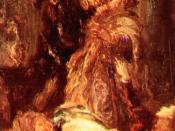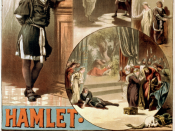Sane, or Insane? That is the Question
Madness vs. Melancholia
One of the most controversial questions surrounding William Shakespeare's tragedy, Hamlet, is whether or not the character was in fact haunted by madness or just acting it. His continuous use of melancholia leaves us as the audience, to ponder upon the true madness of Hamlet.
"Hamlet" is a story about fratricide, madness, melancholia and a constant change of attitudes and emotions.
His madness and melancholia range to different heights through the use of actions, movement and language. But this cannot prove whether or not Hamlet was mad, sane or suffering from a profound emotional depression. Hamlet's idea of assembling a staged play to defy the guilt set inside his uncle Claudius was an intelligent act. Further more, Hamlet's executed madness is shown to be none the less played with lines such as "I am but mad north-north-west. When the wind is southerly, I know a hawk from a handsaw."(
Hamlet, Prince of Denmark, 2.2.340).
Madness vs. Melancholia can be defined as two different emotions. Madness is the quality or condition of being insane. Melancholia, however, is diametrically opposed to that of Madness, where it is characterised by severe depression which is shown through the emotion displayed at the death of Hamlet's father. Thus it rests upon the apprehension of the two directors to illustrate these emotions in a suitable way that best portrays Hamlet. "It will be your and the director's responsibility to decide the quantity and quality of personality characteristics necessary for the development of character."
(Acting In Person and In Style, Pg 162)
Two examples of the different notions that can be portrayed, is that of Franco Zeffirelli's and Laurence Olivier's Hamlet where madness and melancholia compete against one another with one achieving much stronger dramatic meaning...


